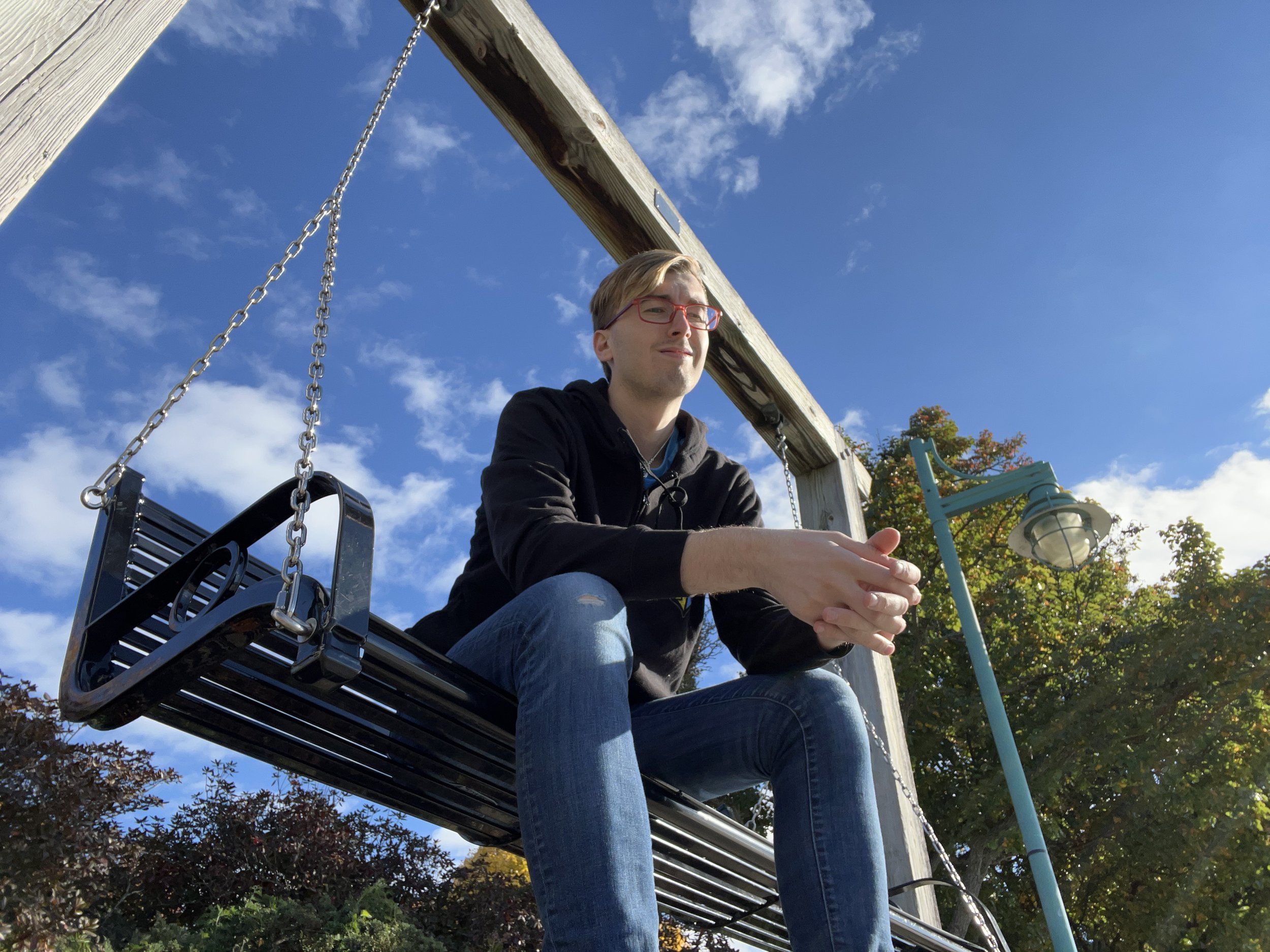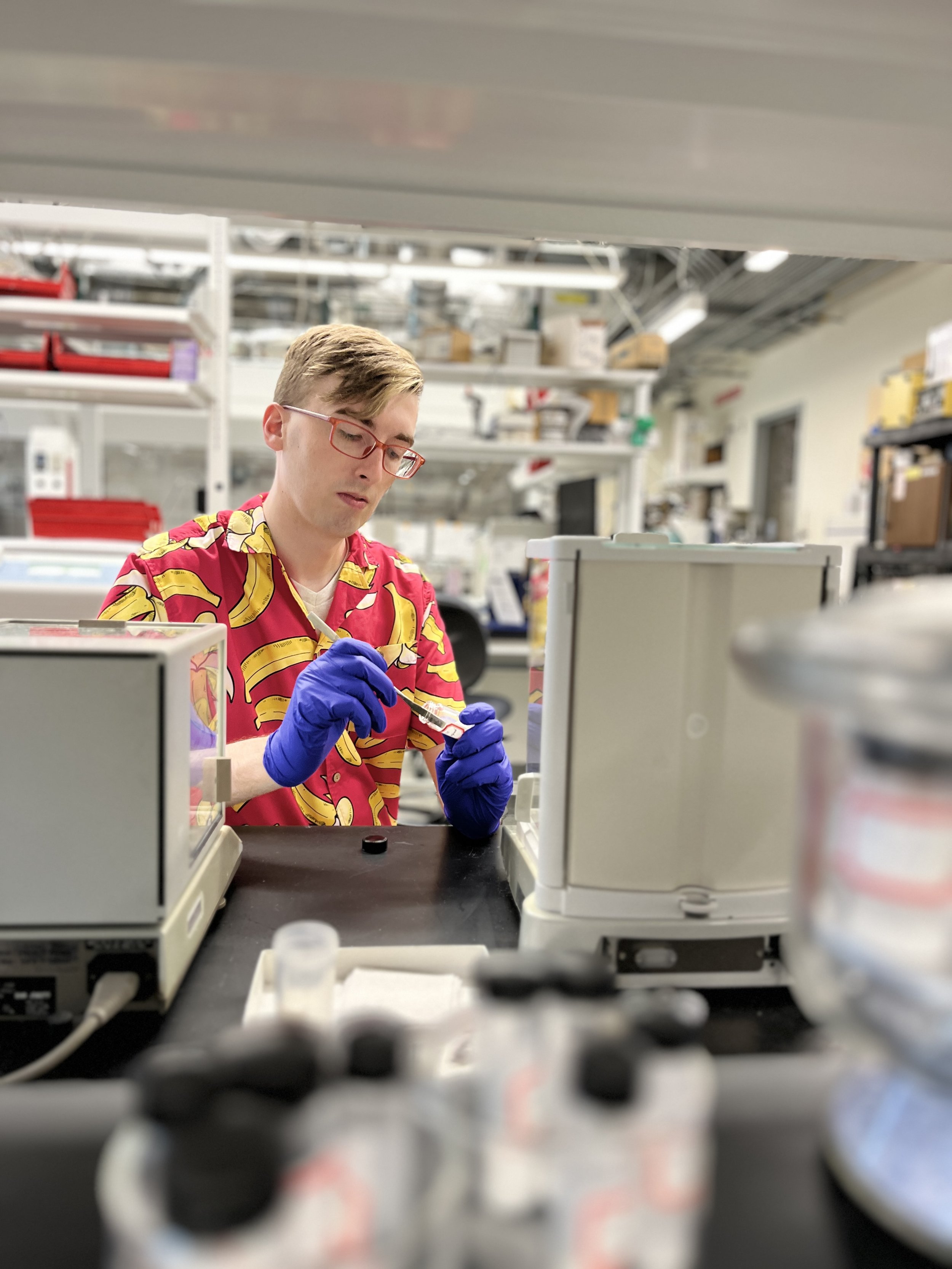Grad student educates and entertains
Graduate student Bradley Cech teaches chemistry in an entertaining way. Photos submitted
By Tom Victoria
Mr. Wizard and the Science Guy got nothing on Bradley Cech. The graduate student gives chemistry lessons on social media in an entertaining fashion similar to the two former television hosts.
Bradley, 27, a New York native who is a student at the University of Vermont pursuing his doctorate to become a professor, has a variety of content on Instagram and TikTok, including experiments and skits. His informative and engaging posts are designed to share his passion for science with a wide audience.
“Teaching is art of theater in a way,” he said.
Being a graduate student, Bradley instructs undergraduates. He said much can be gained in teaching through presentation.
“Ultimately, I want people to see that science is fun,” Bradley said. “Chemistry is exciting. Everything around us from our phones to the food we eat involves some sort of chemistry. Yes, studying chemistry can be taxing and difficult. But getting people to appreciate the wonders of chemistry is something I hope to pass along to the wonderful community we’ve built on social media.”
Some of Bradley’s videos are showing how to make a homemade lava lamp, working with piranha solution (a mix of sulfuric acid and hydrogen peroxide) and demonstrating how dye sticks to protein.
Bradley stressed the importance of remaining positive in education whether in person or online.
“I have gone through several challenges in grad school,” he said. “Living through these, though, I have learned a tremendous amount on how to stay motivated and persevere through the worst of grad school. By sharing positive perspectives on the lessons I have learned, I hope to make life a bit more enjoyable and a lot less stressful for those in similar scenarios.”
Bradley also cited the importance of engaging the students.
“I have had teachers and professors throughout my academic career who were extremely monotone and did not offer any type of engagement toward towards the class,” he said. “Did I learn much in those classes? Absolutely not. Would I have learned more if the instructor was more upbeat about the material? I can almost guarantee that to be true. As instructors, we don’t always have to be positive. However, you will soon find out that students will enjoy your class a lot more if you are positive, understanding and create an environment they want to be present in.”
Bradley said the hardest thing about teaching is reaching every student through every lesson.
“Most people would probably say grading,” he said. “Yes, grading is annoying, but I don’t think it is the most difficult thing about teaching. For me, I would have to say finding a way to make one topic click for all of my students. Each student learns differently. Some like analogies while others prefer complete conceptualness of the material. Finding a way to teach a topic to where every student grasps some aspect of it is the real challenge.”
Bradley said that challenge will never fade.
“This challenge gets more difficult as the generation gaps increase in size,” he said. “I try maintain in the know about pop culture and trends to connect to as many students as possible.”
However, Bradley does find teaching easier overall than he anticipated.
“I’m not sure how to explain it, but getting up in front of a group of students and explaining concepts comes extremely easy to me for some reason,” he said. “Also, boosting students’ self-confidence is definitely something I try my hardest to push for all of my students.”
Bradley said more can be done to ensure all students have access to an adequate education.
“Science and chemistry can be done by everyone,” he said. “However, the sciences are not inclusive to everyone right now, especially those in a minority. That needs to change. We have seen some progress in the right direction, but some is not enough. Science should be made available to all, not just those with the money or a certain complexion. There are schools that are using decades-old textbooks, model kits and such. How can we as a society say science is inclusive when we really mean science is inclusive if you have the money?”
Bradley doesn’t have to fret about staying motivated as his job provides it.
“Without a doubt, it’s my students,” he said. “If I am not feeling great, as soon as one of my students walks into lab, I jump out of my funk to make sure that they are going to have a great time in lab. Ultimately, I am going into teaching for the students. It is the small things like seeing the light-bulb moments when they finally understand something and smile because they got it.”
In Bradley’s spare time, he partakes in a few hobbies.
“I love listening to new music, watching a lot of shows and movies,” he said. “A few talents of mine include juggling and solving the Rubik’s Cube, bot of which I taught myself when I was in middle school. I love hanging out with my Silver Bengal (cat), Orchid. We will go on walks and sunbathe on the grass in summer.”
Bradley’s Instagram: https://www.instagram.com/bradleycech/
Bradley’s TikTok: https://www.tiktok.com/@bradley.cech
Bradley’s YouTube: https://www.youtube.com/@bradleycech







